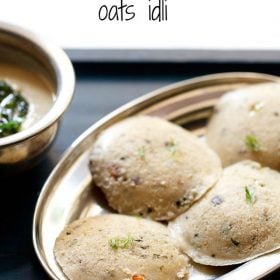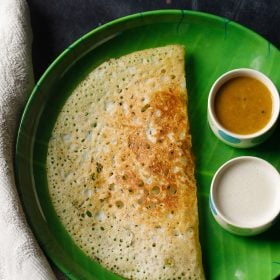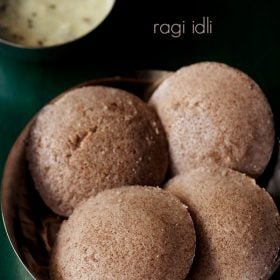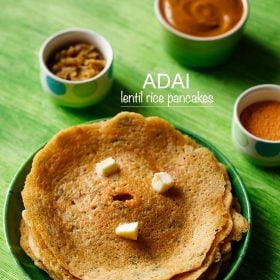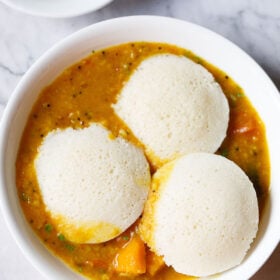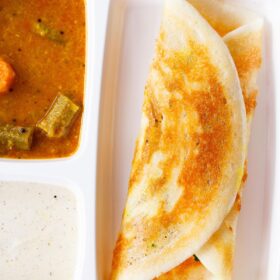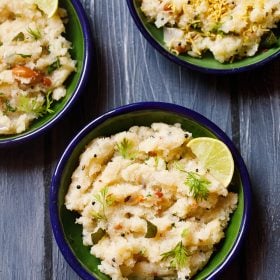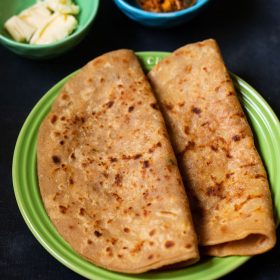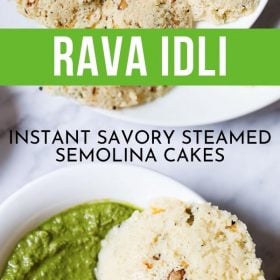Whether a South Indian or no, an Idli is a favorite with most of us Indians. It is tasty, filling as well as the perfect dish when it comes to having just the right kind of nutrition. That’s why a favorite choice of breakfast, across the country too. On this post, I have shared one of my favorite idli variations, the Rava Idli. This Suji Ki Idli recipe gives incredibly light, soft and sumptuous idlis. For this instant idli recipe, I have found the perfect combination of ingredients that result in savory cakes that are fluffy, moist and delicious.
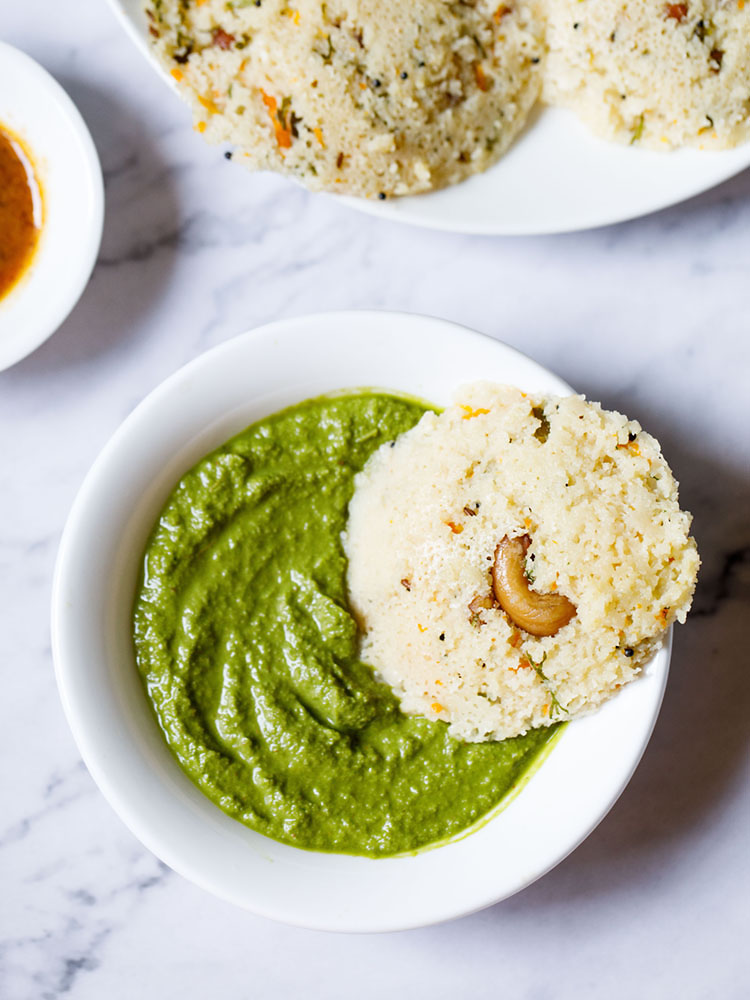
About Rava Idli
Being an idli and Dosa lover, I never say no to the different varieties of both these quintessential South Indian preparations. This recipe of Rava Idli is a tried and tested formula of making really good idlis from cream of wheat or semolina at home.
Also known as Suji Ki Idli (in Hindi) it is a soft, pillowy steamed savory cake made from rava or suji and is a popular variation of the traditional South Indian idli which is made with fermented rice and lentil batter.
‘Suji’ in Hindi, also referred to as ‘rava’ and ‘cream of wheat’ or ‘semolina’ in English, is basically ‘granulated wheat.’
Once you try this Rava Idli, you’ll know that it is equally fantastic and just as amazing as its classic counterpart.
Sometimes, I feel this one is actually better as it brings in a change from you regular idlis. It is always great to have something different, on a daily basis.
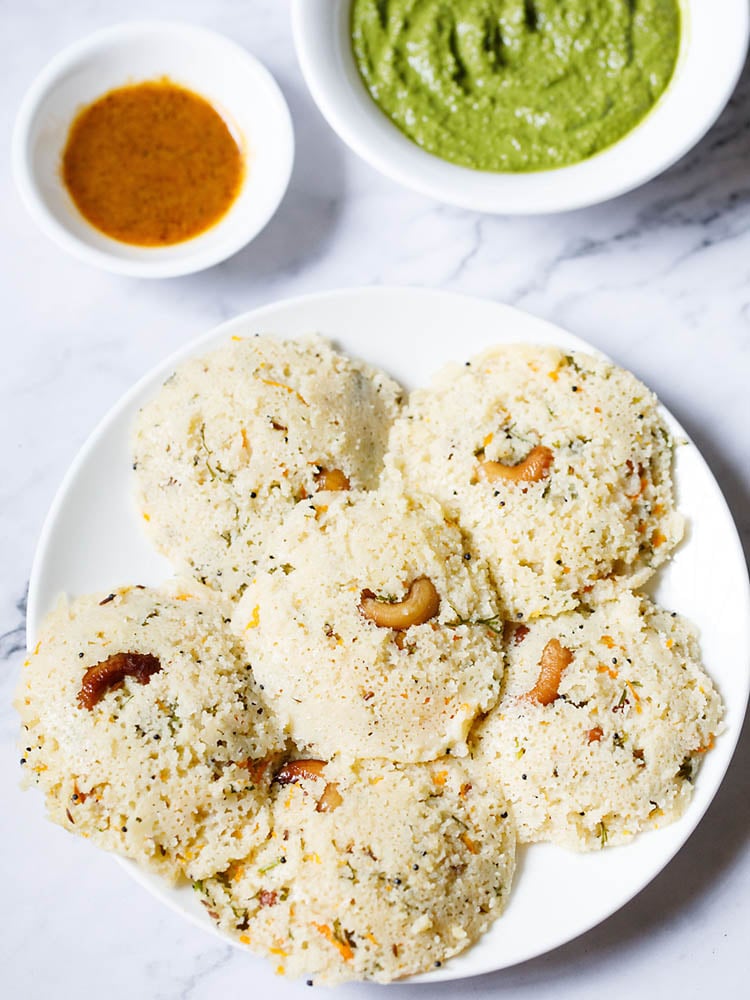
To elevate the nutrition quotient and make a more wholesome dish, I also add some grated carrots in the batter of this Suji Ki Idli.
It also makes the idlis look pretty with specks of orange in them after getting steamed. However, this is not essential and you can skip adding it, if you wish to.
In addition to the carrots, my recipe of Rava Idli also has fried cashews in it. I add a fried cashew in each compartment of the idli stand and then pour the batter in them.
Once steamed, the fried cashew gives a really earthy flavor and texture to the idlis and makes them even more delicious.
About Rava Idli Recipe
Rava Idli recipe is made by mixing ghee roasted rava or suji (cream of wheat) with curd (yogurt), spices, herbs, water and a leavening agent like baking soda or fruit salt (Eno) to make a nice batter of medium consistency.
The reaction of alkaline fruit salt or baking soda with the acidity of the curd helps in leavening the batter. Thereby, giving it a soft and fluffy texture. This flavorful batter is then steamed in an idli maker to make fluffy, pillowy cakes or Rava Idli.
Traditionally, idlis are made of rice and lentils, which involves soaking the rice and lentils for 4 to 5 hours as well as grinding them and then fermenting the batter.
As this recipe of Suji Ki Idli uses suji (cream of wheat), yogurt and a leavening agent instead, all that soaking or grinding time gets eliminated. Thus, making this an easy, instant recipe without any fermentation.
For that reason, I make Rava Idli when I want some quick and easy breakfast or snack. This idli batter gets done within minutes and then, as the idli is steaming, I prepare the coconut chutney, which is the traditional dip to serve with idli.
How to make Rava Idli
Fry Cashews, Spices & Lentils
1. Heat 2 tablespoons ghee in a pan. Keep the heat to low or medium-low and add 14 halved cashews.
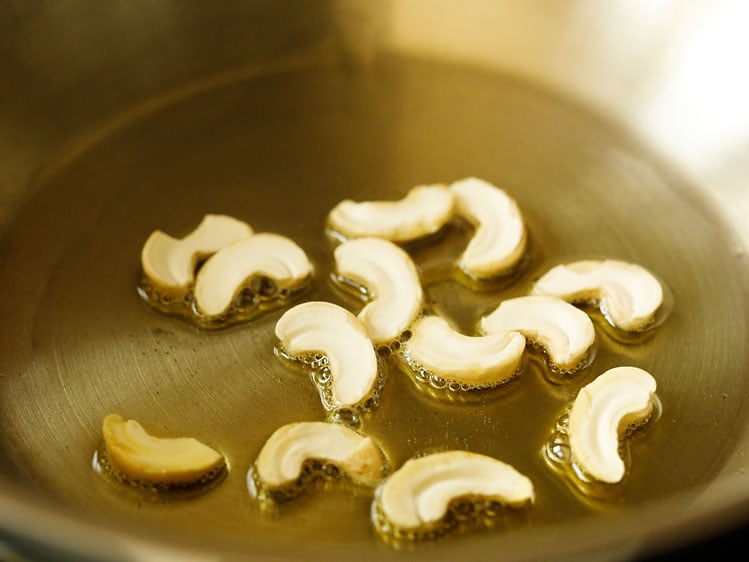
2. Stirring often, fry the cashews till golden. Remove with a slotted spoon draining the ghee and keep aside. Reduce the heat to low or medium-low.
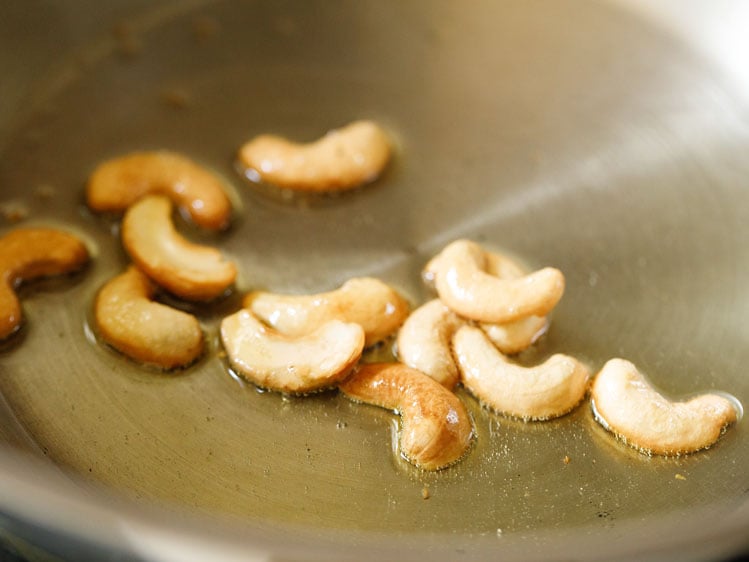
3. To the same pan, add ½ teaspoon mustard seeds. Let the mustard seeds begin to splutter.
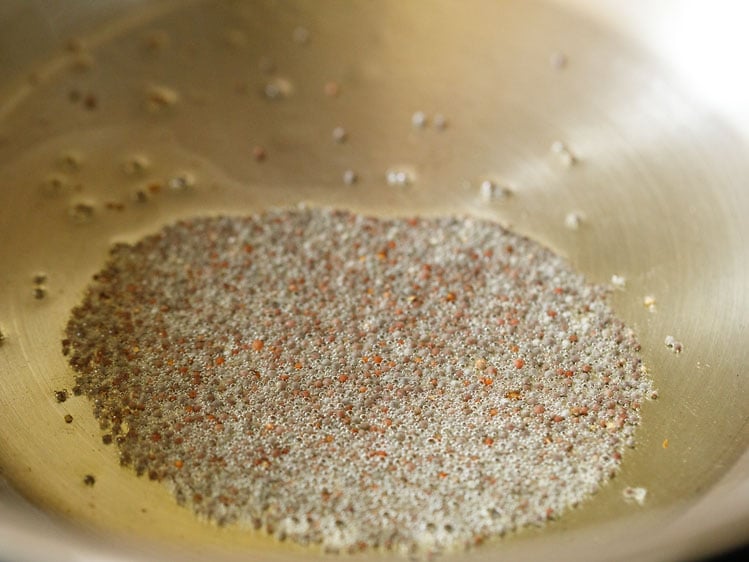
4. Add 1 teaspoon husked and split Bengal gram (chana dal).
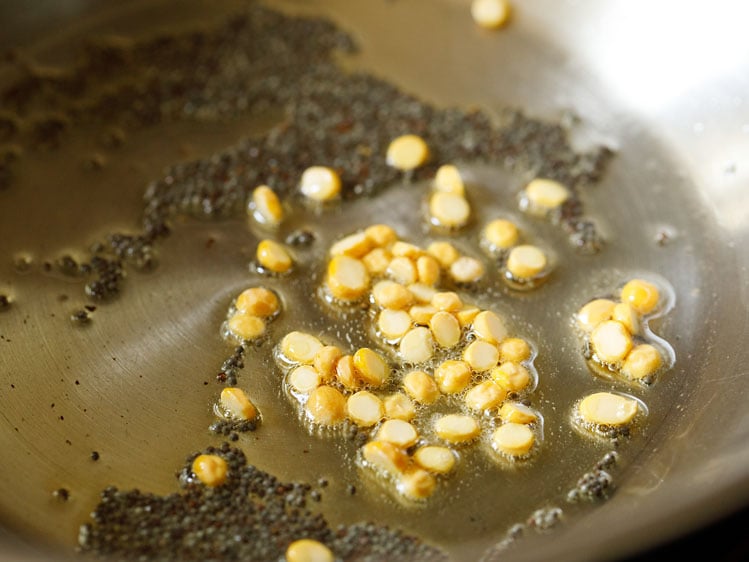
5. Stirring often, fry chana dal till golden and crunchy. Then, add ½ teaspoon cumin seeds and fry for 4 to 5 seconds.
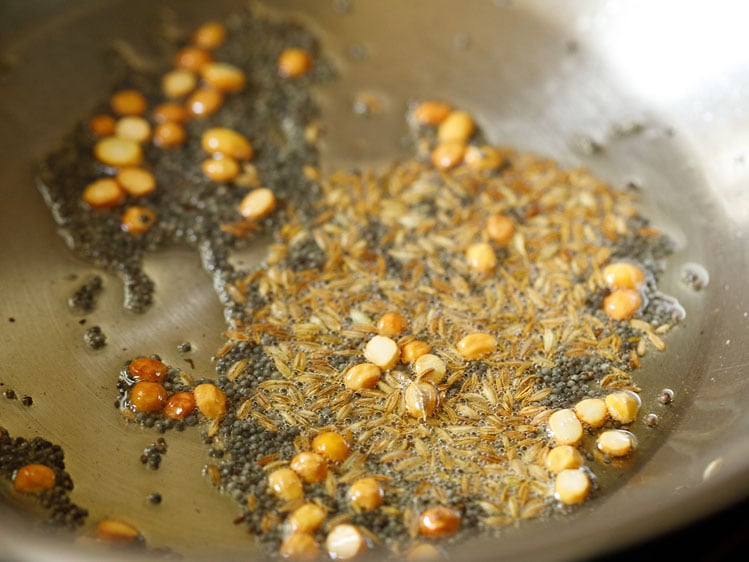
6. Now, add 10 to 12 chopped curry leaves, 1 pinch asafoetida (hing), 1 teaspoon finely chopped ginger and 1 finely chopped green chili (about ½ to 1 teaspoon chopped).
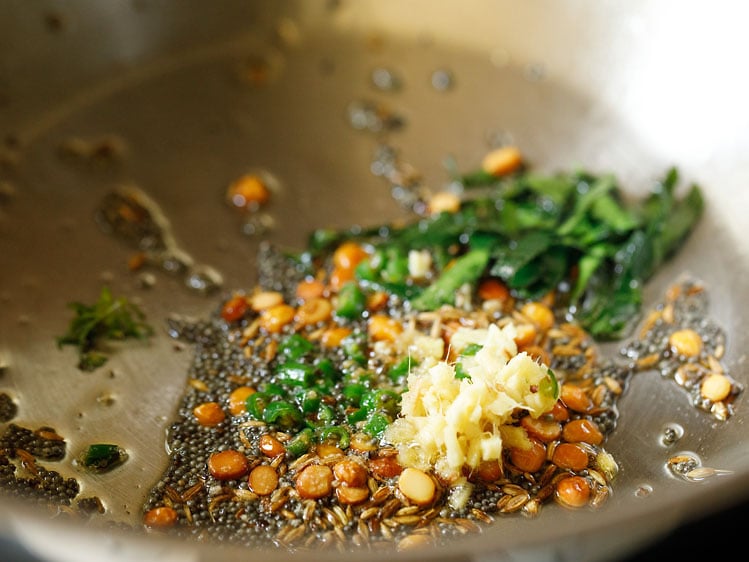
7. Mix well and fry for about 10 seconds. Keep the heat to a low.
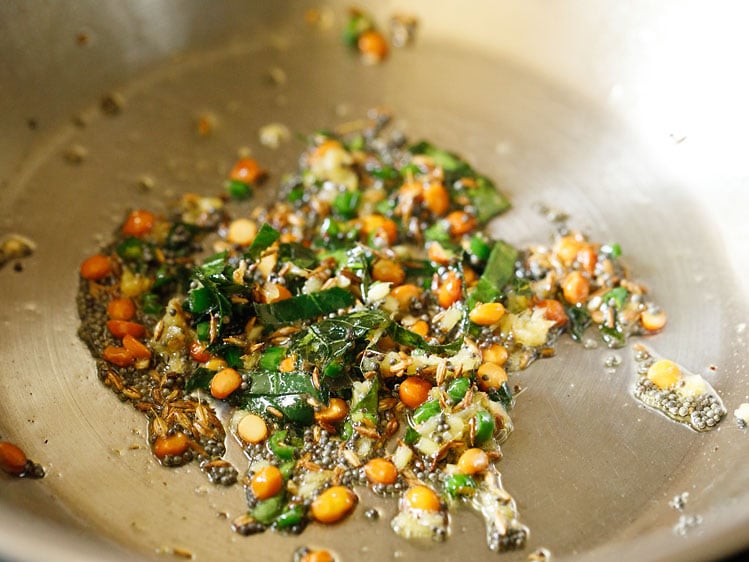
Make Rava Idli Batter
8. Now, add 1 cup rava or suji (finer variety of cream of wheat or semolina).
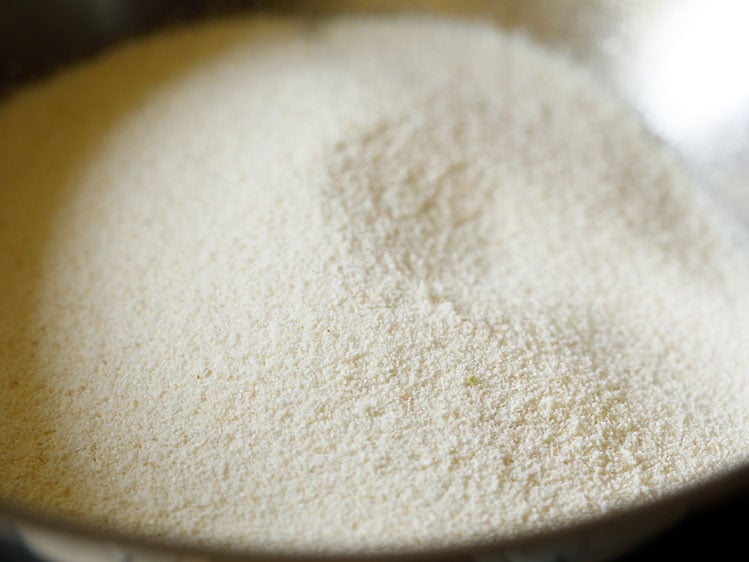
9. Mix the rava very well with the ghee and other ingredients.
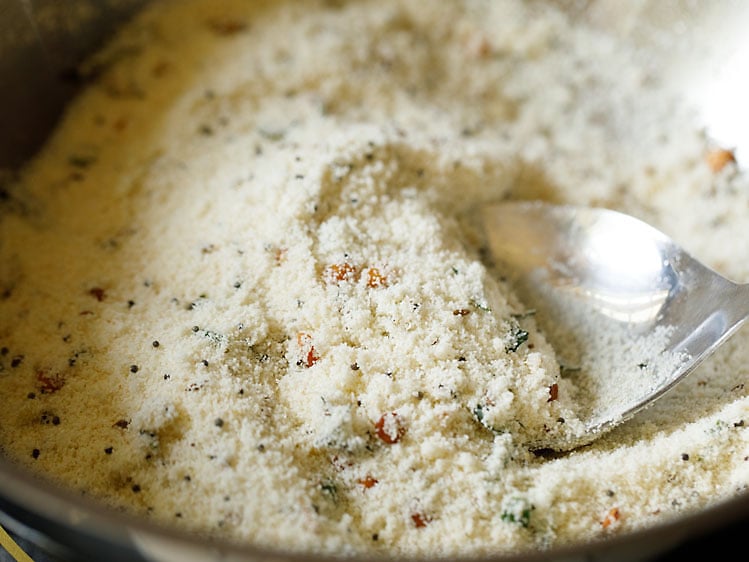
10. Roast rava till it become aromatic, changes color a bit (but should not get browned or golden) and the grains look separate. Stir often.
Roasting rava takes about 5 to 7 minutes depending on the thickness and heaviness of the pan and the heat intensity.
Once the rava is well roasted, keep the pan aside. Let the rava become warm.
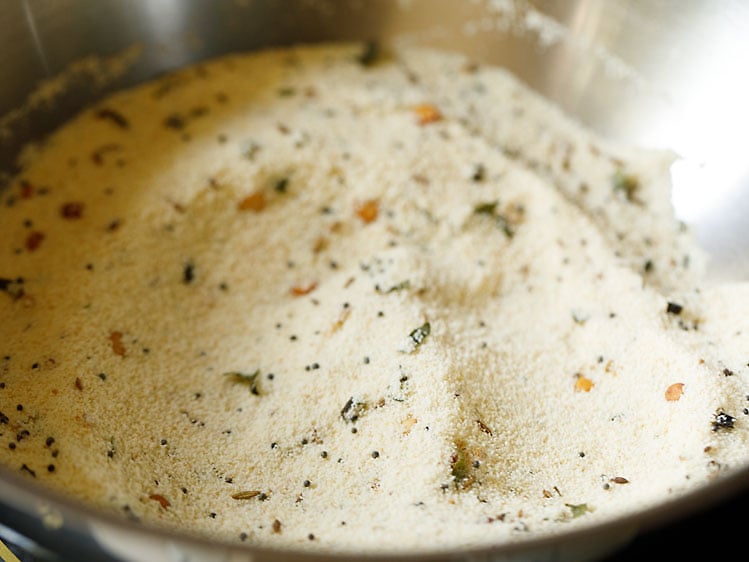
11. To the roasted rava, add 2 tablespoons finely grated carrots, 2 tablespoons chopped coriander leaves and ½ teaspoon salt or as required.
If adding any other grated vegetables or steamed green peas, then add them at this step.
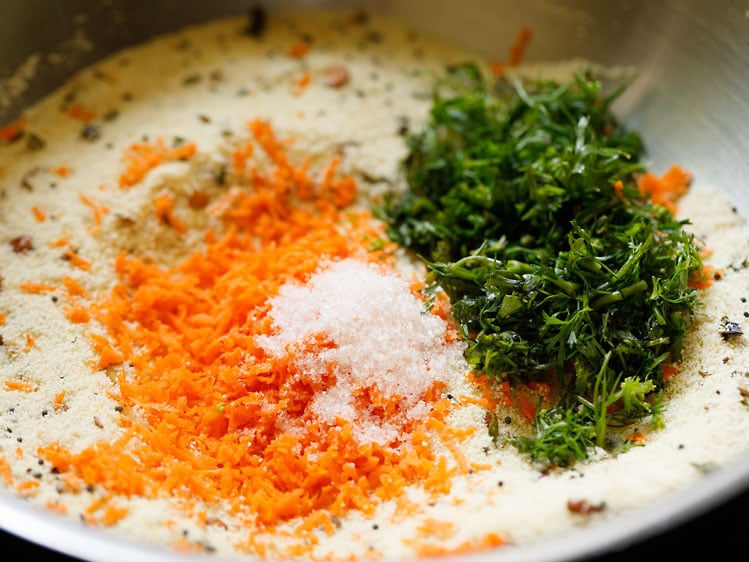
12. Next, add ½ cup curd (yogurt) and ½ to ¾ cup water. Depending on the quality of rava and the thickness of curd, you can adjust the water.
Tip 1: If the curd is liquid and has whey in it, then add ½ cup water.
Tip 2: If the curd is very thick, then add ¾ cup water. Basically, you need to get a medium consistency batter.
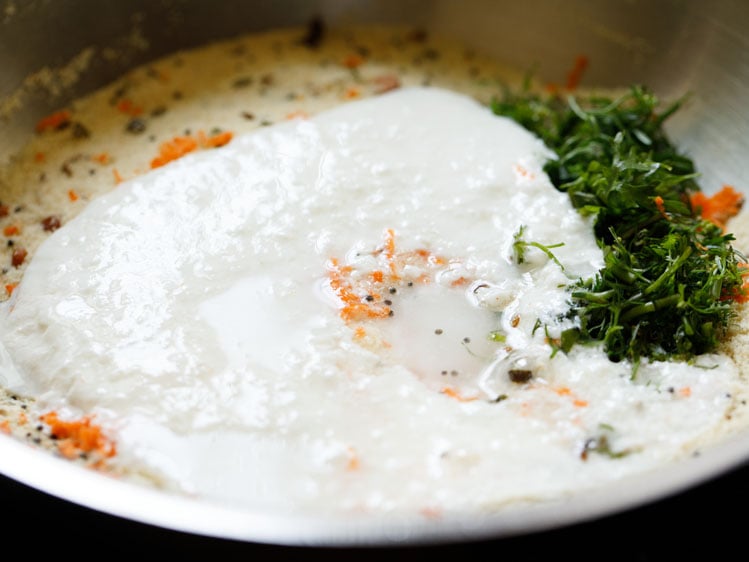
13. Mix very well and let the batter rest, covered for 20 minutes. The idli batter is neither thick, nor thin in consistency. It has a medium consistency.
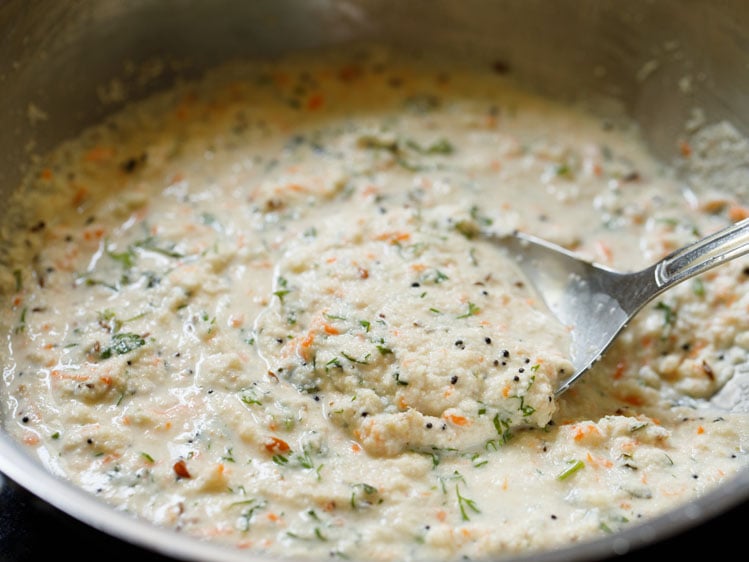
More Prep
14. Brush oil or ghee on the idli moulds. Place a fried halved cashew in the center of the moulds.
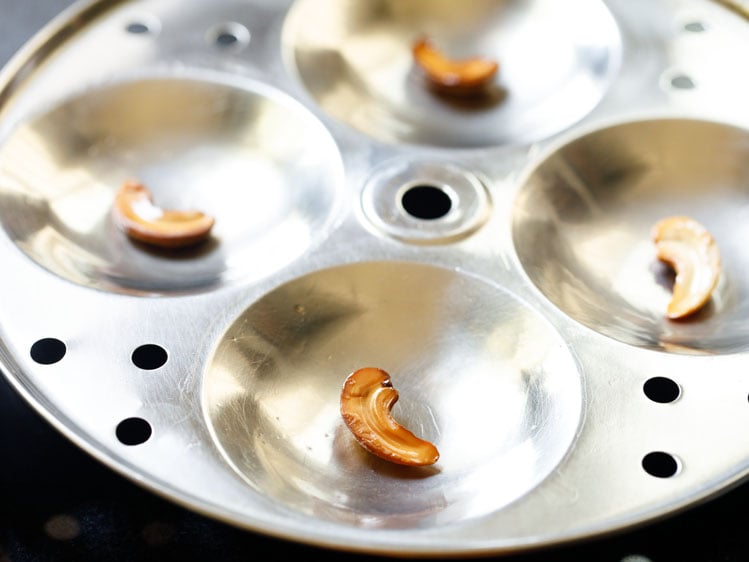
15. Before you add fruit salt (Eno) or baking soda to the batter, take 2 to 2.5 cups water in a pot.
Keep a small length trivet stand or a rack in the pot. Heat the water till it comes to a boil.
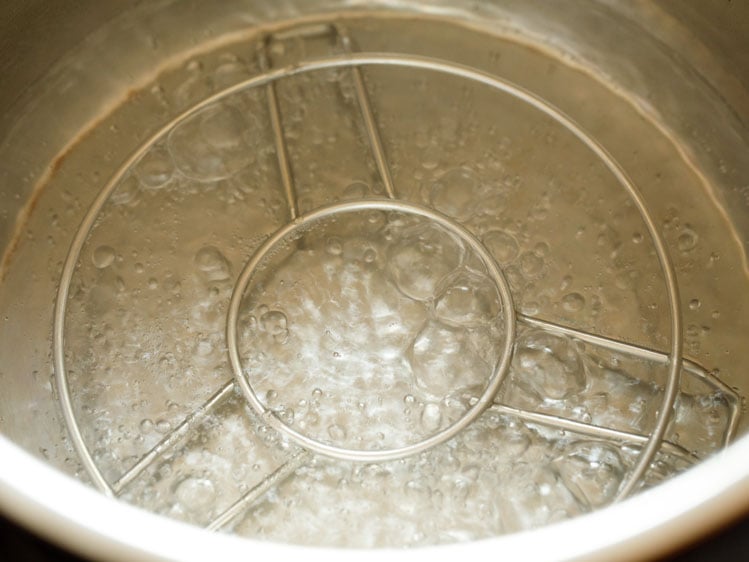
16. After 20 minutes, this is the consistency of the batter. In case the batter looks thick, add 1 to 2 tablespoons water to get a medium consistency.
Rava absorbs water. So, the batter might thicken after 20 minutes. If the curd is thick, then also you may need to add more water.
In case you have added more water in the beginning, you do not need to add any water at this step.
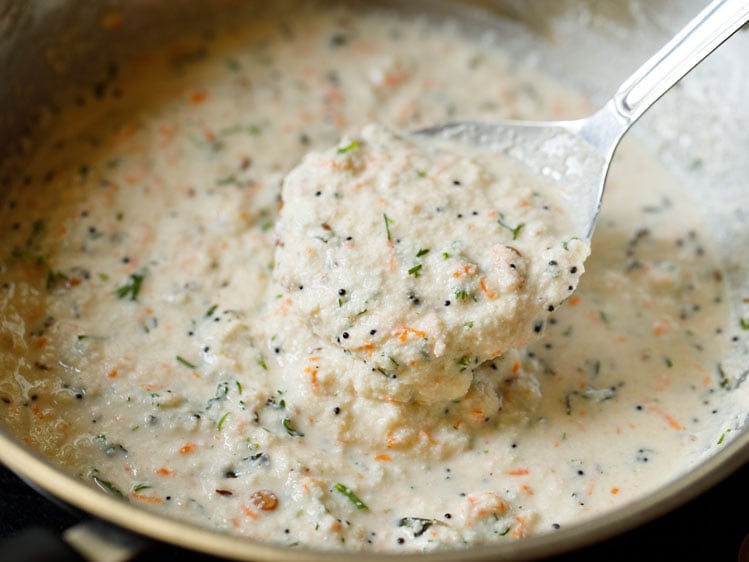
17. Sprinkle 1 teaspoon fruit salt (Eno) or ¼ teaspoon baking soda evenly over the batter. I have used Eno.
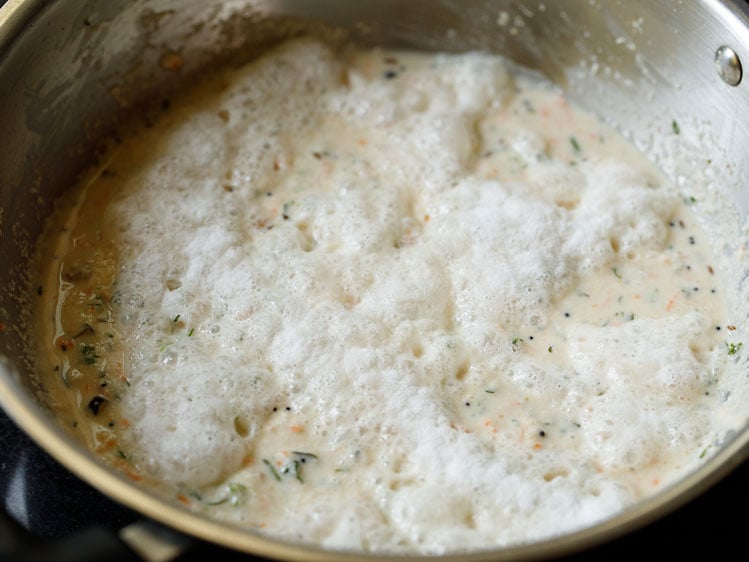
18. Mix very well, quickly.
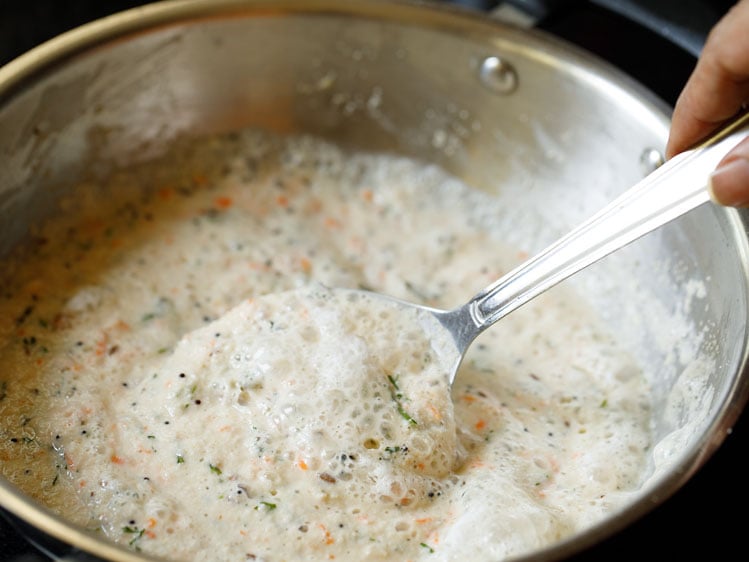
Make Rava Idli
19. Pour the batter in the greased idli moulds.
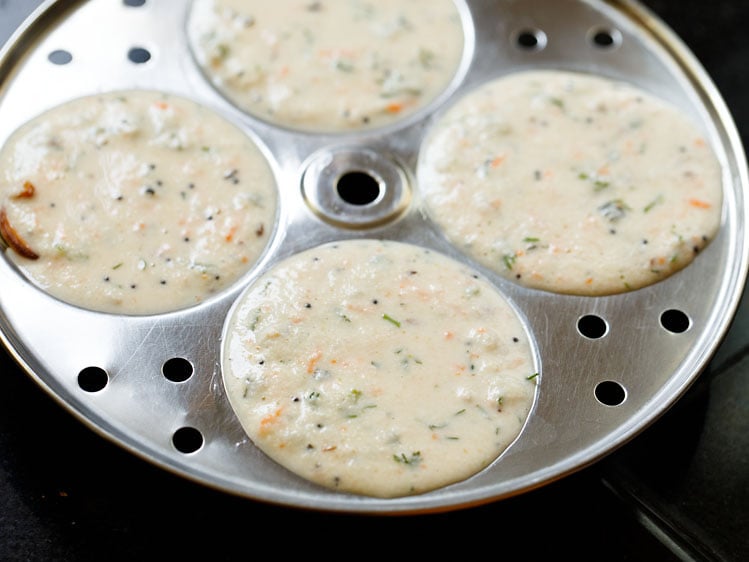
20. Stack each idli plate and place them in the pot with the hot water. Cover with a lid and steam Suji Ki Idli for 10 to 12 minutes on medium heat.
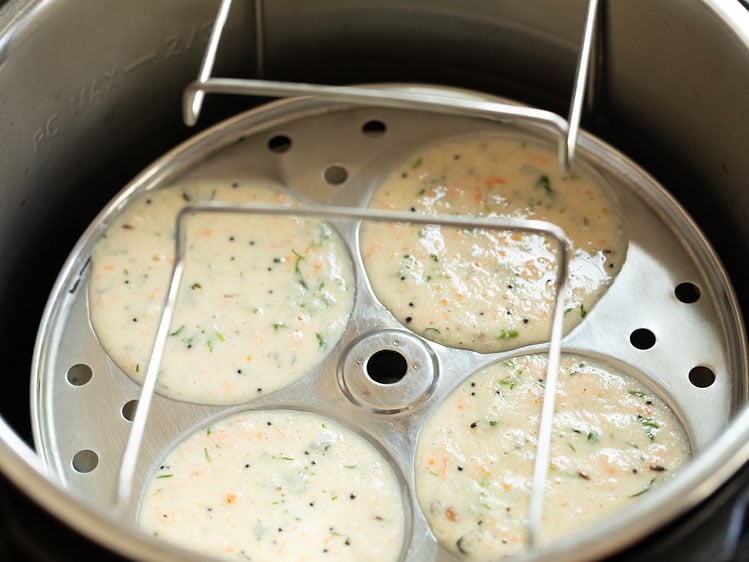
21. I have used the Instant Pot for steaming and had set the time for 10 minutes (check notes section in recipe card on finer details for steaming in the IP as well as pressure cooker and pan).
Keep a stop-watch or timer to check the time as Instant Pot does not beep in the steaming mode after the steaming time is over. It will continue to steam further.
You can even steam idlis in an electric cooker, pan or pressure cooker for 10 to 12 minutes.
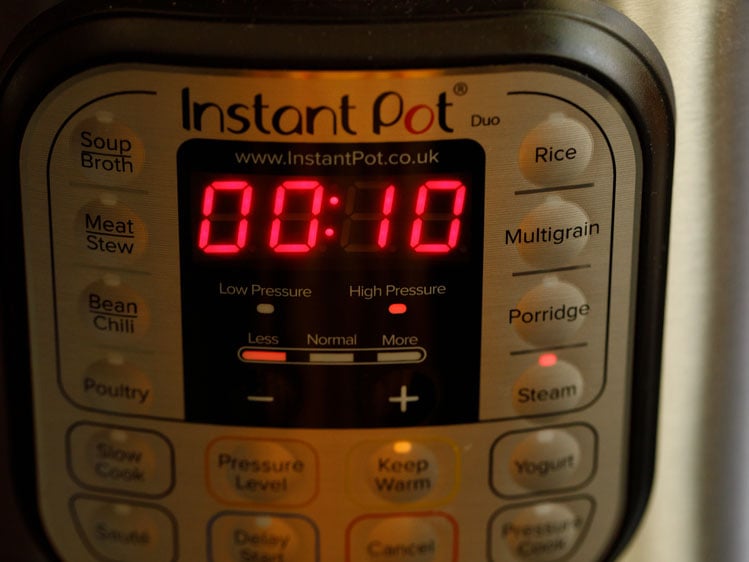
22. To check the doneness, a bamboo skewer or a fork inserted in the steamed idlis should come out clean.
Remove the idli plates carefully and let them rest for 3 to 4 minutes. Then, with a spoon remove the idlis.
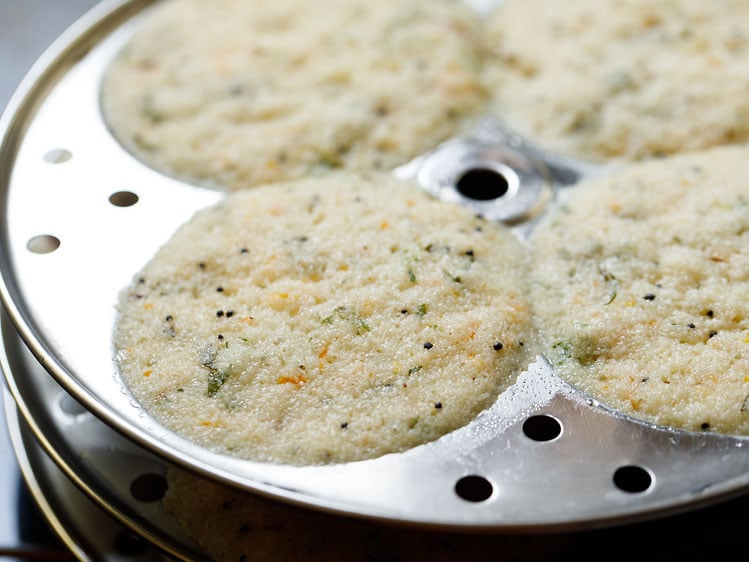
23. Serve Rava Idli hot with sambar, coconut chutney or coriander coconut chutney.
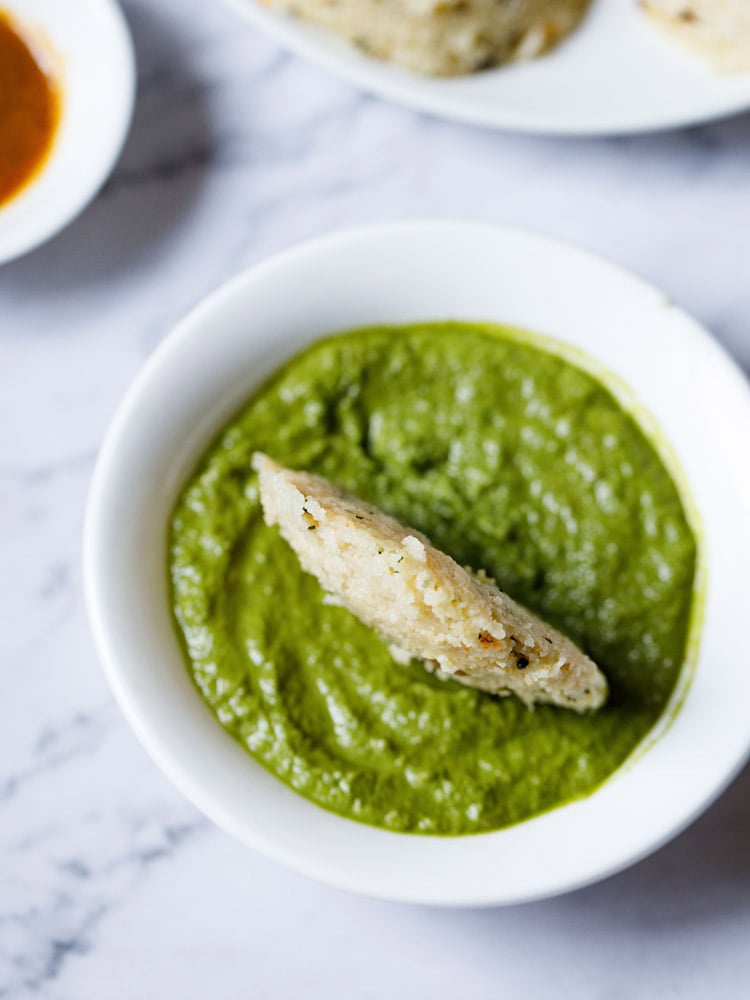
Serving Suggestions
Here are some of the common as well as some not so common ways that you can serve the Suji ki Idli. Check them out:
- Coconut Chutney: Rava Idli tastes the best with the classic coconut chutney or a Coriander Coconut Chutney too.
- Sambar: These idlis made with rava also taste good with a sambar – a traditional South Indian vegetable stew cooked with lentils, vegetables and tamarind.
- Potato Sagu: Rava Idli and potato sagu – a lightly spiced potato curry from the cuisine of Karnataka – is a great combination.
- Idli Podi: Idli podi makes for a fabulous side with Rava Idli. It is a dry powder made with lentils and dried red chilies and has a spicy, earthy flavor along with a slight crunchy texture. Sesame oil or ghee is mixed with the podi to make a yum paste that is served with the idlis.
Expert Tips
- Leavening Agent: 1 teaspoon of fruit salt (Eno) is perfect for the amount of rava and curd used in the recipe. Results in soft, fluffy idlis without the soapy aroma. If you use baking soda, add ¼ teaspoon (2 to 3 pinches) of it in the batter. The spices and herbs also add a lot of flavoring of their own in the recipe.
- Vegetables: I have added some grated carrots to the batter, which you can skip. You can even add steamed green peas. Just boil the peas beforehand and also grate the veggies ahead of time so they are ready to be added. You can also also include grated beets or finely shredded cabbage or finely chopped bell peppers.
- Curd (yogurt): I have used fresh curd. Both fresh or sour curd can be used to make the idli. Another variation of idli is this idli made with rice rava where cream of rice is used, instead of cream of wheat.
- Water: In case the curd you are using is thin and runny with lots of whey in it, add ½ cup water. If it is very thick, then add ¾ cup water. Adjust the quantity of batter to get a medium consistency batter.
- Idli pan: You will need an idli pan to make these steamed cakes. Idli pans are made to fit perfectly into a pressure cooker or steamer. If you can’t find an idli maker in the market, you can always order one online from Amazon.
FAQs
The fine variety of rava, not coarse. You can use Bombay or chiroti rava.
Eno or baking soda should be fresh and within their shelf period. If not fresh or active, they won’t leaven the batter, resulting in hard idlis. Also, the moment you mix in Eno, steam the batter immediately. If you keep the batter resting, the idlis won’t fluff.
Yes. Roasting rava coats the fine rava grains with ghee, which helps in giving a light texture to the idlis, without being sticky or gluey.
Yes. But add as much of it, till you get a medium consistency batter.
You can skip. But then the idlis won’t have a fluffy texture. They will be soft though, with a slight denseness.
Yes, you can. But add Eno or baking soda just before steaming. The batter will also thicken. So, add a few tablespoons of water and mix well before steaming.
No. Baking powder is not an alternative to baking soda or fruit salt. You will need to add more quantity of baking powder. This will result in metallic and bitter tasting idlis.
You can use a pan or bowl for steaming.
Adding more of the leavening agent gives a crumbly texture.
Not roasting the rava well and too much water can result in stickiness.
Less water and prolonged steaming will give a dry and denser texture.
More South Indian Breakfast Recipes To Try!
Breakfast Recipes
Breakfast Recipes
Breakfast Recipes
Breakfast Recipes
Please be sure to rate the recipe in the recipe card or leave a comment below if you have made it. For more vegetarian inspirations, Sign Up for my emails or follow me on Instagram, Youtube, Facebook, Pinterest or Twitter.
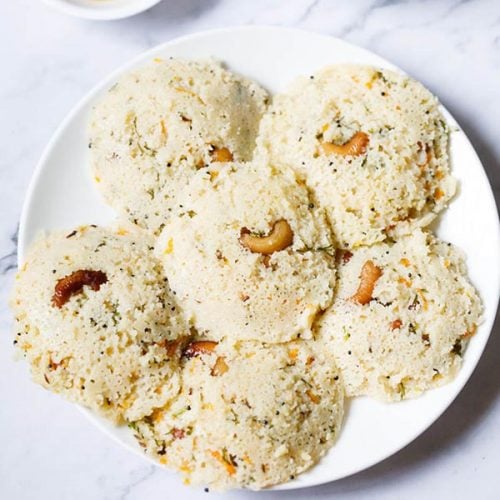
Rava Idli (Easy and No Fermentation)
Ingredients
For frying & roasting
- 2 tablespoons Ghee (clarified butter)
- 7 to 8 cashews – halved
- ½ teaspoon mustard seeds
- 1 teaspoon chana dal (husked and split bengal gram or split & husked chickpeas)
- ½ teaspoon cumin seeds
- 10 curry leaves – chopped
- 1 pinch asafoetida – optional
- 1 teaspoon ginger – finely chopped or 1 inch peeled ginger
- 1 green chilli – finely chopped or ½ to 1 teaspoon, chopped
For batter
- 2 tablespoons carrots – finely grated, optional
- 2 tablespoons coriander leaves – chopped, (cilantro)
- ½ teaspoon salt or add as required
- 1 cup rava – 175 grams (sooji, semolina, cream of wheat)
- ½ cup Curd (yogurt)
- ½ to ¾ cup water or add as required
- 1 teaspoon eno (fruit salt) or ¼ teaspoon or 2 to 3 pinches of baking soda
Instructions
Preparation
- Heat 2 tablespoons ghee in a pan. Keep the heat to low or medium-low. Add the halved cashews.
- Stirring often fry the cashews till golden. Remove fried cashews with a slotted spoon draining the ghee and keep aside.
- To the same pan add mustard seeds and let them begin to splutter. Keep the heat to low or medium-low.
- When the mustard seeds begin to splutter add the chana dal. Stirring often fry chana dal till they look golden and crunchy.
- Then add the cumin seeds and fry for 4 to 5 seconds.
- Now add the chopped curry leaves, asafoetida, finely chopped ginger and green chillies. Mix well and fry for 10 seconds. Keep the heat to a low.
- Next add rava (cream of wheat, suji, semolina).
- Mix well and stirring often roast the rava till they become aromatic, change color a bit (but should not get browned or golden) and the grains look separate.
- Roasting rava will takes about 5 to 7 minutes depending on the thickness and heaviness of the pan, and the flame intensity.
- Once the rava is well roasted, keep the pan aside. Let the rava become warm.
Making Batter
- To the roasted rava, add finely grated carrots, chopped coriander leaves and ½ teaspoon salt or add as required.
- Next add curd (yogurt) and water as required. Depending on the quality of rava and the thickness of curd, you can adjust the water from ½ to ¾ cup.
- If the curd is liquid and has whey in it, then add ½ cup water. If the curd is very thick, then add ¾ cup water. Basically you need to get a medium consistency batter.
- Mix very well and let the batter rest covered for 20 minutes. The rava idli batter is neither thick nor thin in consistency and has a medium consistency.
- Brush oil or ghee on the idli pan moulds. Place a fried halved cashew in the center of the moulds.
- Also heat 2 to 2.5 cups water in a pot. Keep a small length trivet stand or a rack in the pot. Heat the water till it comes to a boil.
- After 20 minutes this is the consistency of the batter after resting. If in case the batter looks thick, rava idli batter looks thick, then add 1 to 2 tablespoons of water to get a medium consistency.
- Rava absorbs water and so the batter might thicken after 20 minutes. If the curd is thick, then also you may need to add more water. If you have added more water in the beginning, then you may not need to any water at this step.
- Sprinkle 1 teaspoon eno or ¼ teaspoon baking soda evenly over the batter. Quickly mix very well.
Steaming Rava Idli
- Pour the batter in the idli moulds. Place them in the pot with the hot water. Cover with a lid and steam rava idli for 10 to 12 minutes on medium heat.
- To check the doneness, a bamboo skewer or fork inserted in the rava idli should come out clean. Remove the idli plates carefully and let them rest for 3 to 4 minutes. Then with a spoon remove the rava idli.
- Serve the steaming hot rava idli with sambar and your favorite coconut chutney.
Video
Notes
- Type of rava: Kindly use the finer variety of rava and not the coarser or bigger ones. You can use bombay rava or chiroti rava.
- Roasting rava: The rava has to be roasted well in ghee so that they do not become sticky after steaming.
- Leaving agents: Eno (fruit acid) and baking soda are the leaveing agents used in the recipe. You can add either of them. Do make sure they are fresh and within their shelf period. If they are not fresh or active, they won’t leaven the batter resulting in hard rava idli.
- Skipping the leavening agents: You can skip them, but the rava idli won’t have a fluffy texture. They will be soft though with a slight denseness in the texture.
- No idli pan, no problem: Use a cake pan or bowl for the batter and steam. Once steamed well, then slice in wedges or cubes.
- Steaming: Do not steam for a prolonged time as this will result in dense rava idli. You can easily steam in a pan, instant pot or a pressure cooker.
- Steaming in a pan: Heat 2.5 cups water in a large pot or pan. Place a small trivet stand. Then place the idli pan on the trivet. Cover with a lid loose enough to let the steam pass or with a vent. Steam for 10 to 12 minutes.
- Steaming in a pressure cooker: Heat 2.5 cups water in a 5 or 6 litre pressure cooker. Place the pressure cooker grid plate inside the water before heating it or a small trivet. Keep the idli pan. Remove the vent weight (whistle) from the lid. Seal the pressure cooker with its lid. Steam for 10 to 12 minutes.
- Steaming in Instant Pot: Add 2 to 2.5 cups water in the steel insert of a 6 quart IP. Place a small trivet in the water. Using the sauté option bring the water to a boil. Press cancel. Place the idli plates. Cover with the IP lid and keep the sealing position to vent (so that the steam is released from the vent during the entire process of steaming). Press the steam button on high and set the time to 10 minutes. Use a stop watch to check the time.
- Note that the approximate nutrition info is for 1 rava idli.
Nutrition Info (Approximate Values)
This Rava Idli recipe from the archives first published in November 2013 has been updated and republished on February 2023.
